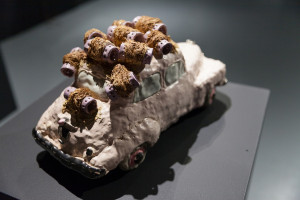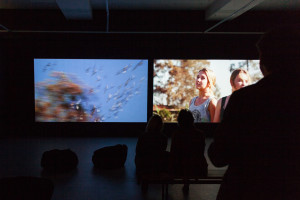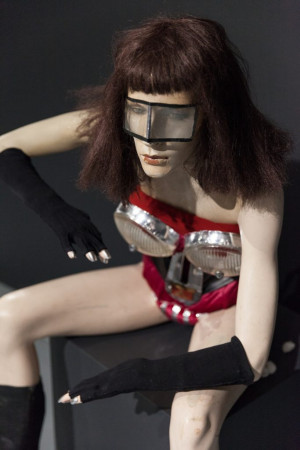#FRANFEST2017
Melissa McGrath
Published September 2017
I’m new to Adelaide. Over the last sixteen months I have been learning about new artists, new galleries, new issues, and new histories. History is important to this state, tracing it, remembering it, and maybe more recently, re-framing it.
Prime among my discoveries has been The Women’s Show, which in 1977 brought together work by over four hundred women artists. The event was not out of step with the pioneering identity of this state when you consider South Australia was the first in the country to give women the right to vote,[1] and maintains to this day a unique currency in community based practice and organisation.
Today we are in the midst of FRAN Fest,[2] a festival developed by the Feminist Renewal Art Network to celebrate the 40th anniversary of The Women’s Show and take pause to consider the ‘complex history and contemporary nature of feminism and art in Australia, with particular focus on Adelaide initiatives’.[3] Exhibitions, events, performances, and a symposium span over forty venues, from the illustrious institution of the State Gallery to the traditionally working class area of Port Adelaide, which is simultaneously resisting and bending to gentrification. FRAN has opened many conversations about the role that these forms of community organisation and exhibition play in a changed (and charged) cultural landscape.

My first taste of FRAN came as part of Vitalstatistix’s annual national hothouse of experimental and multidisciplinary arts projects in development, Adhocracy.[4] Amongst a suite of works, the 2017 commissioned project Second Hand Emotions led by the creative team of Mish Grigor, Sarah Rodigari, and SJ Norman responded to the provocation ‘love and feminism’. As a process-driven, discursive project, the women who took part in the 9-day residency talked, and shared, and sang, and wrote, and walked, and cried (secretly), while exploring the limits and spaces of the feminism they each occupied. They shared their outcomes in zines and poetic presentations that were laced with inside jokes and a shirking of definition. I found there to be something poignant about the refusal to provide the audience with ‘an answer’, while also something naive and nostalgic about the lack of knowing where to go next.
Framed as a significant link to the history of The Women’s Show, This Woman is Not a Car[5] at ACE Open features a retrospective of work by ceramicist, filmmaker, and original exhibitor, Margaret Dodd. Centred around her film which lends its title to this exhibition, This Woman is Not a Car explores the isolation and objectification of women in domestic roles in the late seventies. Listening to Dodd’s conversation with curator Susan Charlton I had a profound moment of realisation, when she described the context for the 1977 exhibition as ‘women coming out of isolation, out of marriage, and meeting up’.[6] In those few words she articulated an urgency and opportunity for self-discovery and validation that I couldn’t quite sense within this first iteration of FRAN.

While there were notable exhibitions at FELTSpace,[7] Fontanelle,[8] Praxis Artspace,[9] and a dynamic re-hang of the Australian post-war gallery at the Art Gallery of South Australia,[10] the make-up of most exhibitions was overwhelmingly white, and seemed to take shape as a greatest hits of established names and locations within the Adelaide art community.
The difficulty of building a community-based festival, and the representation of minorities within artistic contexts was grappled with in a number of forums as part of FRAN. The artist talk by Kate Blackmore discussed her two-channel video work GIRLS[11] and the challenges of working with communities, within the context of artistic institutions and with the pressure of outcome. I was also lucky enough to participate in a panel conversation alongside powerful women of colour Amanda Radomi, Haneen Martin, and Aida Azin exploring ‘intersectional feminism in the South Australian arts’. Our discussion was dominated by recognition of the time necessary to consult, connect, and include, and the tension between essentialist understandings of identity and the complex reality of the experiences of women and non-binary people in Australia today.

In the last three weeks I have had many conversations: about an arts sector structured around festivals and spectacle as opposed to the long-term development capable of drawing in voices of difference; about the forgetfulness and bent for ‘the new’ in contemporary art which leaves us tackling the same challenges for generations; and the fact that FRAN FEST needs to be just the beginning of a longer, wider survey of practices before we get closer to not only reflecting the complexity of where we find ourselves socially and politically in 2017, but also providing a sense of where we need to move toward.
The conversation has picked up again, we’ve got so much more to hear.
Look up Mary Lee, she was a badass suffragette whose legacy is currently celebrated by the Mary Lee Exchange, a series of panel discussions focusing on sharing stories through community discussion. http://maryleeexchange.com/
FRAN FEST is running 25 August – 24 September 2017, http://franfest.com.au/
Brigid Noone, Jude Adams, Leone Furler and Mia van den Bos, ‘FRANIFESTO’, FRAN FEST Program, p1, accessed 29 August 2017. http://franfest.com.au/assets/pdf/FRAN_Program_2017.pdf
Adhocracy ran 1 – 3 September 2017. http://vitalstatistix.com.au/adhocracy-2017/
This Woman is Not a Car, running 8 – 30 September 2017. http://aceopen.art/exhibitions/this-woman-is-not-a-car/
Margaret Dodd, Artist talk with Susan Charlton, 9 September 2017, ACE Open.
on/off circle by Nancy Downes, and 21st Century Explorer by Alycia Bennett, running 7 August – 23 September 2017. http://www.feltspace.org/exhibitions-current/
Love and Feminism, curated by Brigid Noone, running 9 September – 8 October 2017. http://www.fontanelle.com.au/
I Am A Feminist But…, curated by Eleanor Scicchitano, running 31 August – 28 September 2017. http://praxisartspace.com.au/im-a-feminist-but/
Re-Thinking Australian Art. http://www.artgallery.sa.gov.au/agsa/home/Exhibitions/NowShowing/Australianartpost1945
GIRLS by Kate Blackmore, running 8 – 30 September 2017. http://aceopen.art/exhibitions/girls/
Biographies
Melissa McGrath is a curator, writer, collaborator and educator from Western Australia, currently based in Adelaide. Through her creative practice she explores the development and dissemination of understandings, focusing on printed matter, exhibition making, hosting and public dialogue as vehicles for collection, learning, political and social agency. She has curated projects and exhibited in public spaces and artist-run initiatives across Australia, and runs Reception Project Space, a domestic ARI from the front room of her house. Melissa is presently Manager, Arts Programs at Carclew, the peak body for youth arts in South Australia; previously Education Programs Curator at the Perth Institute of Contemporary Arts. She has interned at the Peggy Guggenheim Collection Venice, The Nasher Sculpture Center Dallas, the Fremantle Arts Centre and participated in the Australia Council for the Arts’ 2017 Venice Biennale Professional Development Program.